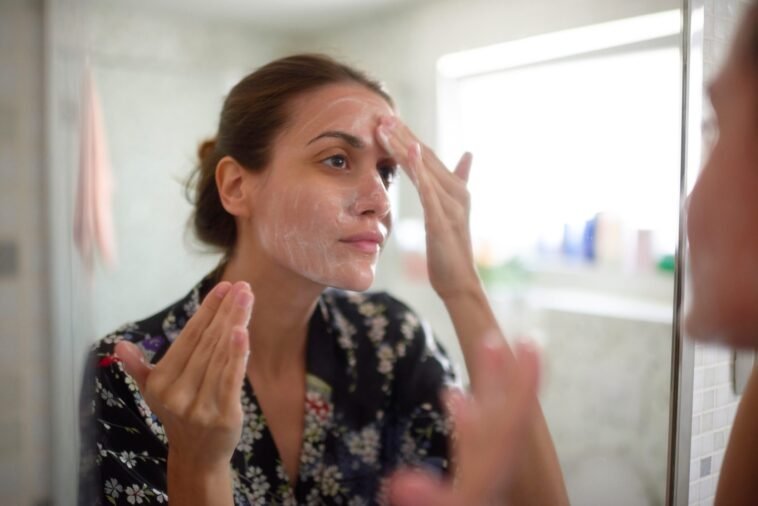We must take care of our skin during seasonal changes to keep it healthy and soft throughout the changing of the seasons because as we all know, the seasons have an impact on our skin as well. So here we go with some tips.
What impact does summer have on your skin?
The sebaceous glands in your skin start producing too much sebum when the temperature and humidity increase (natural oil). The retained oil from the release causes stickiness, greasiness, and clogged pores on the skin’s surface. Acne flare-ups are the most typical summertime problem. Because sweat and skin bacteria combine to generate acne and clogged pores, those with oily skin are more susceptible to it. When your skin is exposed to UV radiation, more melanin is created to protect it from fading. The melanin’s photoprotective qualities. Too much melanin leads to skin that is darker and more tanned. Other problems can include sunburn, prickly heat, itchy skin, and rash from sun sensitivity.
How to Take Care of Your Skin in Summer?
-
To get rid of extra oil cleanse your face
Oily skin may become even oilier in the summer. Use a face cleanser that can deep cleanse and get rid of all the dirt and grime that is appropriate for your skin type. A non-foaming cleanser is required for people with dry skin. Select gentle cleaners with a pH balance that is alcohol-free.
-
Apply Sunscreen
UV-A and UV-B rays from the sun are quite abrasive. In addition to providing you with a persistent tan, they can result in early ageing, age spots, fine lines, and wrinkles. Even if you spend most of the summer indoors, all skin types should use a decent sunscreen with SPF 30–50. If you swim, we advise applying sunscreen several times.
-
Avoid heavy makeup
The skin cannot breathe when heavily made up. Heat and humidity have an effect on the skin’s ability to breathe. If you need to wear makeup, you may want to think about utilising tinted lip balm and tinted moisturiser rather than heavy foundation and other cosmetics.
-
Use a good toner
A quality toner may be useful for closing pores. The T-zone of the face has the greatest density of sebaceous glands. Use a toner with an aloe vera or cucumber base to keep perspiration and oil from blocking these pores because they are lighter.
-
Drink more water and fruit juice
Water intake in summer should be a minimum of 2-3 litres a day. Coconut water, watermelons, and fresh juices are good ways to stay hydrated. Drinking water also helps to flush the toxins from the body. Include yoghurt and buttermilk in your diet drink more water and eat fruits.
-
Go For Seasonal Fruits And Vegetables
Include salads and vegetables like cucumber and lettuce in your food – this helps the body stay cool from within. Seasonal fruits like watermelons, and musk melons; citrus fruits and juices also help keep the skin healthy.
SPRING SKINCARE
Spring is where we’ll begin. There is no need for any AC because the birds are chirping, the sun is out, the weather is pleasant with a little wind, and we are constantly moving indoors and outdoors. Our skin is currently quite happy with itself. Allergies are the only significant factor that many people in this season have in common. One of the numerous ways that allergies can impact the skin is by making it swollen and/or dry. Why is that so? When we take allergy medication, it tends to dry out both the inside and outside of our bodies. The temperature is finally rising! While dry skin may not be an issue this season, you will still need to revive any radiance that may have been diminished by the winter.
-
Facial cleanser
Use the Cleanser to make your skin more radiant. The clay-to-mousse combination will purge pollutants and energise weary, dull skin.
-
Face scrub
Use the lotion and scrub to maintain the glow. The scrub gives your skin a deep exfoliation that is gentle and leaves it radiant.
-
Clean Your Makeup Brushes
Pay particular attention to your cosmetic goods as you are spring cleaning your closets and cabinets. Every time you use a makeup brush or sponge, bacteria and filth that are difficult to notice are transferred to your face. Lay your brushes flat to dry for 24 hours after gently washing them with a natural cleanser.
-
Winter Skin Care
When winter arrives, your skin is the first thing you start to notice changes. Skin that is dry, harsh, and irritating is a special guest this season. Why do you ask? By drawing moisture from the surroundings, your skin maintains its own level of hydration. Your skin becomes dehydrated and feels dry as the humidity levels drop.
-
Use a mild amount of cleanser
If your face feels tight and dry after washing during the winter, you may need to switch your cleanser. You need a softer, more hydrating, weakly acidic cleanser that won’t dry out your face and balances the pH levels of your skin.
-
Eat Healthy Food
It is important to maintain a healthy diet to maintain water content and boost sebum production in the body. Consuming foods rich in vitamins E, A and C can maintain good skin health. Some winter fruits rich in Vitamins and antioxidants:
- Gooseberry
- Papaya
- Avocado
- Pineapple
- Banana
-
Wear Loose and comfy Clothes
If you wear tight clothing, dry skin in the cold may become even more sensitive. To prevent discomfort, wear comfortable clothing.
-
Don’t Over-Wash Your Face
Although it sounds contradictory, washing your face too often can further dehydrate your skin. Don’t cleanse more than twice a day.
What Skin Issues Can I Have In Winter If I Don’t Take Proper Care?
- Rash
- Dermatitis
- Psoriasis
- Heavy Base
A heavy, cream-based moisturizer is recommended if your skin is getting dry. This will avoid irritation. Get yourself a moisturizer with antioxidants and heavy emollients to help relieve dry skin better.
Does Your Skin Change With The Seasons?
It’s true that skin changes with the seasons. Winter’s dry weather causes the skin to lose its natural moisture, resulting in scaly, itchy skin. Due to sweat, blocked pores, and acne breakouts, humidity during the summer can result in bacterial infections. Both heating and air conditioning in the summer and winter can dry up the skin. Thus, specific skincare guidelines are established for each season. Summertime calls for extra care and attention for your skin. You can shield your skin from the damaging effects of the sun and heat by taking a few easy precautions including washing and moisturising, staying hydrated, and applying sunscreen. Let us know if our advice was helpful for you.
Tips for all seasons
It is always advised to pay attention to your skin when you transition into any season. Consider changing your skincare routine to best suit the circumstances by paying attention to how it feels and how it looks in the mirror. In the domain of beauty, a classic error is to worry when things start to go wrong. In our fear, we want to make more changes than are actually necessary. And it’s all right! We are permitted to make mistakes and have second thoughts since we are human. This is why we have experts to rely on who can guide us through the confusing maze of skin care and the path to healthy skin. If you could use some advice, seek the assistance of a qualified skin therapist. Knowing how to handle the changing of the seasons and skin conditions is all the more powerful to live in our healthiest skin.
*Tania Mumtaz is an in-house Makeup Artist at Neemopani. She is passionate about makeup and is a freelancer Makeup artist as well.





